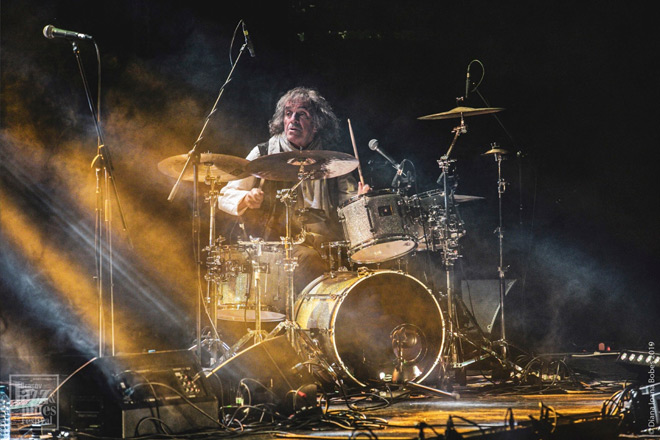
Speaking of which, he recently released a uniquely personal book titled Letters to Sarah. Compiled of letters he wrote to his mom during years on the road, the book is very different from what other Rock musicians have released and is a must read. Continuing to tour, and recently putting out the new album Toledo Sessions, Laing sat down to chat about his unpredictable and exciting journey into the world of music.
Cryptic Rock – You have been involved in music professionally for well over five decades, attaining a great deal of success with Mountain, as well as many other collaborations. First, briefly tell us, how would you describe your career in music?
Corky Laing – Luck – the four letter word that starts with L. It’s not just my career: any kind of success that goes on in this particular business of ours, you have to have a lot of luck. Then, of course, you have to be prepared. Whatever you are going to do you have to have your chops, background, 10,000 hours, then you get the luck. I do believe timing is everything. I would say you have to step in a lot of shit and get lucky.
I’ve been lucky: I’m healthy, it’s been over five decades I’ve been a professional, but I don’t feel it. I don’t feel scarred, I know there’s a lot of people who are well-balanced characters, and they have the same size chip on both shoulders, but I don’t buy that. I think this is a place in life where if you’re lucky enough to make a living, have a roof over your head, have some good friends and fans, and hopefully have some good repertoire, to me that’s pretty much it!
Cryptic Rock – That’s great and you get to do what you love following your passion.
Corky Laing – Exactly right. I can’t say I planned any of it. I would like to be bold and conceited about it, but no, this is spontaneous. It is all the things that go along with it that give an enchantment and mystery. I wouldn’t ever want to destroy the mystery of what we don’t know.

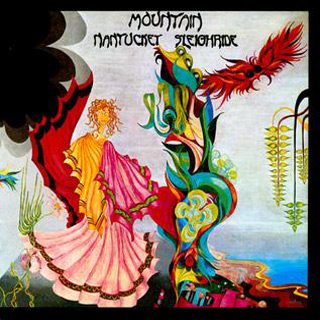
Cryptic Rock – That makes sense. As mentioned, you have collaborated with a lot of unique people in music throughout the years. Everyone has something different to offer and teach, what have your experiences been like?
Corky Laing – That’s a good point. I love to collaborate because as a drummer, in general, you are always communicating – you’re always touching and feeling what is in somebody else’s vessel and how they go about it.
There was a time and era where a lot of people did interact; I’m not talking about social networking and computers, I’m talking about in person when you got together, had a beer, or got together and talked. I got a lot of maybes turned into deliberate get togethers. It started out with my bass player George Gardos in my first band Energy – we wrote songs that eventually became Mountain lead tracks like “For Yasgur’s Farm” and “Sitting on a Rainbow.”
You have to connect with people. As a drummer, from the early days of the caveman you were banging on drums to communicate with a tribe across the ocean or whatever it is; you are banging out drums and communicating. A lot of my writing comes from the drums by the way; my musicality is limited to drums and a little guitar. A lot of my work has been in the lyric department. Over the years, whether it has been Meatloaf, Ian Hunter, or John Sebastian, I’ve been really fortunate to cross paths at a time where these people wanted a collaborator. There are some great writers who don’t need it and I respect that totally.
When I come into different situations people say, “What do you want this to be about? What do you want to say?” I think what you want to say is very important. In my case, I love to tell stories in lyrics. When I was in Nantucket I had good friends who were writers – the Benchley who wrote Jaws (1975), Frank Conroy a book prize winner – so we hung out together. You talk about writing, the curve, and the story; I fell into that. I guess I was lucky enough to connect with different people such as “Easy Money” with Ian Hunter.
These writers I met wrote novels so it would be fun for them to come in and diddle on the piano and say, “Why don’t we take a novel and put it in a song?” Frank Conroy was terrific that way. With Leslie West there were not too many stories, he wanted to get right to getting laid, getting drunk, and go for the Rock-n-Roll decadence. I don’t want to include Jack Bruce on that, he was much more esoteric. Pete Brown, who wrote with Jack, was brilliant with that. I fall into that because I like to do it and feel comfortable. When you do a story it’s a dialogue. I don’t know how much more I can say about collaborations, they are as good as who you are working with. If you connect with the right people it works.
Cryptic Rock – You take something away from everyone you work with – positive or negative – and you then apply that to whatever you work on next.
Corky Laing – Yes, well said. That’s the interesting part: everybody I’ve written with, there is something that comes out of it all the time. I’ve sat with Gregg Allman, we both had a buzz on, talking about different things, but nothing ever came of the song except for the first part of the lyrics. Gregg’s a brilliant writer, but people have definitive ideas of what they want to say and how they want to say it. How they want to say it has a lot to do with the basic music track. In my case I always went to the drums in terms of phrasing between the bass drum, snare, and between the ride.
It basically comes down to the substance of the music matching the lyric. If it’s a dark song, it’s a dark song. Some writers write a cheerful track for a dark song. Paul Simon does that all the time. There is a dynamic that I think works – you can have a slow beat, keep it very sinister, and then talk about the most beautiful things in the world over that beat. It’s very interesting on any level. It’s all been said before, all the songs have been written. The only difference is what the personality brings to these songs when they record it. That’s what’s really fun and interesting, every generation has their own theme about their life.
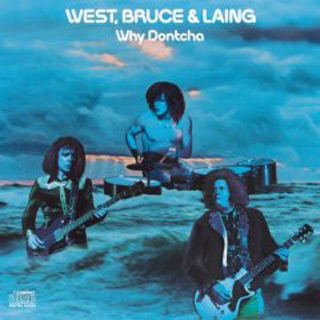
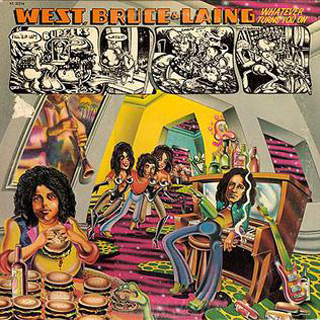
Cryptic Rock – That is very true and that is what makes music very interesting. You mentioned your band Energy. You left Energy and went on to Mountain which had a lot of success. What was your time like in Mountain?
Corky Laing – It was a learning process. Oddly enough, recently I was moving in Toronto and my son found some tapes from the band Energy that are 50-60 years old. We lost track of the tapes, just found them, my buddy George transferred them from quarter inch. The band was a middle of the road band, it was a Pop band. The songs I was writing with Energy were very elaborate kind of Pop songs. I wasn’t versed in playing heavy and the only thing I had going for me was nobody was very versed, at that time in the late ’60s, in heavy drumming. What happened was electric bass came out in the ’60s, so the drummer could start playing heavy without worrying about the stand-up bass drown out. That made Rock happen; that made the drummer aggressive – you were able to play loud and what you wanted.
Over the years getting into Mountain was a learning experience. We didn’t have any significant mic-ing that has been going on for the last couple of decades. I had to play and cut through these huge amps and all I had was a couple of mics. In order to cut through I had these timbales and I used my cowbell a lot because they were metal and they cut through a lot of the songs we were starting to write. It was a learning process that I had to physically beat the shit out of these drums so I could literally be heard. Then, of course, I had to have some chops that were hopefully original, which came down to literally a cowbell intro in “Mississippi Queen.” Which I guess at this point I am privileged enough to be called the ‘more cowbell’ king; of course since then there has been cowbell in a lot of songs.
The Mountain adventure, climbing that mountain was great. It’s like when the US landed on the moon: I landed on the throne in Mountain. Two very propitious moments, these were big time things, I would like to think of them as one spacey and one more spacey. I was spaced out in Mountain, that’s where the fun was. Felix Pappalardi was lovely because he allowed me to play pretty much whatever I wanted in a lot of these songs even though he was a conductor. He knew what he wanted from the music, but he told me, “Corky you tell me what you feel about this.” That’s a real honor to be given that, no click track!
I didn’t have to follow anything. I was able to really enjoy it and execute some of the partners. Mountain was the beginning of that and oddly enough over in Europe, even to these days, they consider me a Heavy Metal drummer. I don’t think I ever was, but I’ve had long talks with Bill Ward from Black Sabbath who said, “You don’t understand, you were playing so hard.” I said, “I had no choice! I had Felix and Leslie at 11 at every show.” Thank god, when you’re challenged that’s when it works.
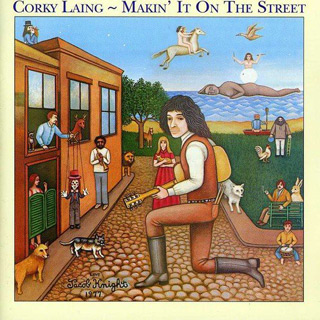

Cryptic Rock – Wow, that is pretty amazing. Let’s talk about your new book Letters to Sarah which was released on Mother’s Day 2019. This book was inspired by letters you had written to your mother over three decades. What led to you putting this book together?
Corky Laing – That is a good question. I was working with a professor in Finland, Tuija Takala. One of the things she said, when she looked up my Wikipedia, “There’s nothing really here about you, maybe I can help you enhance it?” So we chatted about a couple of ideas for memoirs, but between you and I, everybody was writing memoirs so I said I don’t know. I stored all my mother’s things when she passed away, and she found a box of 150-200 letters that I had written to my mother that she saved unbeknownst to me. Tuija Takala found them and said, “Wait a second, these letters outline 30-40 years of you writing on the road.”
Through my career I would write my mother a lot because I was lonely on the road. I tell you, when you are either playing a shithole or Carnegie Hall, when you get back to the hotel, it’s basically just you and your conscience. Tuija said, “How about we work the letters as a time clock over the 30-40 years where you are writing mother of where and how you felt? I want to enhance that letter with added thoughts and retrospective.” Tuija was brilliant! She’s a professor at the University of Helsinki. She was very interested in the life I had, so that worked. Her and I really collaborated beautifully on the book. I never planned on it being that kind of book, but she had a vision. She took it and made a book out of it, I am very, very proud.
Cryptic Rock – It is a very compelling book. Seeing that these letters were written over a three plus decade period, what was it like looking back at these very personal moments you shared with your mom?
Corky Laing – I had some varied feelings on that. Tuija chose most of the letters; there were some very personal letters, I had mixed feelings. Some of them brought back some very wonderful memories, but there were also some really down periods, challenging times in this industry. I was just a kid from Montreal, starting out 13 or 14-years-old, and I wasn’t even planning to be a musician; I just loved playing drums and writing. In the book I think Tuija took the most substantial, poignant thoughts that I had and she made it work by embracing some other thoughts along the way. I had varied and mixed feelings; I gotta tell you some of them were very bittersweet.
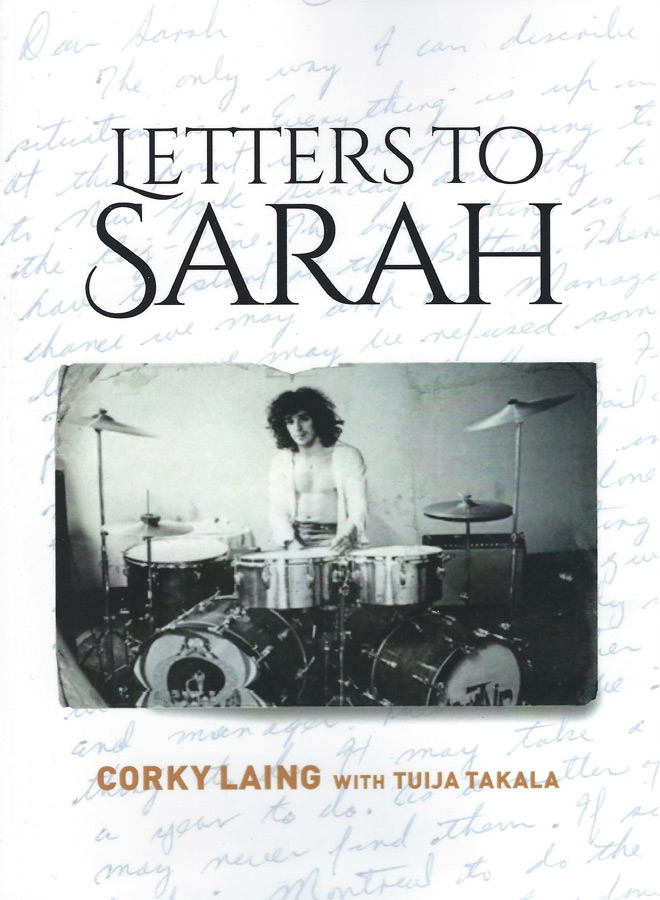
Cryptic Rock – Right, and as we get older our opinions and thoughts change; we change as people.
Corky Laing – Yes, that is right. Everything changes, even the changes change. The last half of a century there have been so many changes, music especially. Just think of the different formats that came and went. At this point everything is disposable.
Cryptic Rock – Sadly that seems to be the case. Beyond the book, you are still out there playing live. What is like getting out there playing live?
Corky Laing – It’s a joy, an absolute joy. At this point I’ve left all the paranoia and neurosis in songs/albums of the past. I’m really enjoying the freedom I have now. I feel the only thing I have to prove is to myself; I don’t have anything to prove to anybody else as far as I’m concerned. I consider myself pretty critical on that front.
At this point some of my audience is grandparents, some are dirt napping, but some of the newer audiences are very interested. It’s almost a historic thing. Over in Europe they are looking at this as a way of life; this is a cultural history lesson going over the last 40 to 50 years. The one thing that remains clear in my life is the music – the downbeat, the backbeat, the beginning and the end. It’s a simple life and I’m enjoying that part of it.
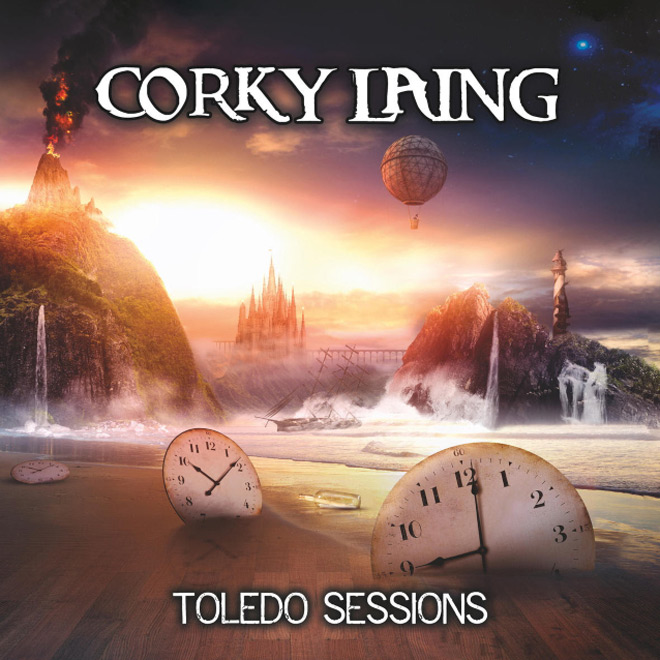
Cryptic Rock – That is great to hear and you also have new music out too with the album Toledo Sessions! One final question for you. If you are a fan of Horror and Sci-Fi films, do you have any favorites?
Corky Laing – I wouldn’t call it Science Fiction, but I love the trilogy on The Hobbit. I wish I could tell you a lot more about my favorites in Science Fiction, but I’m feeling pretty vacant there. I loved The Godfather (1972), which again, we all seem to love. I remember I did a Meatloaf movie score and there was a Horror film I did the music for called Evil Judgment (1984). I don’t know how far the film went, but I love to participate in movie scores; they are fun to do. Whiplash (2014) is a movie I loved, and Birdman (2014) was terrific. Another movie I loved was Drumline (2002), the drums on it are brilliant. I guess I am a little prejudice about the drums. (Laughs)
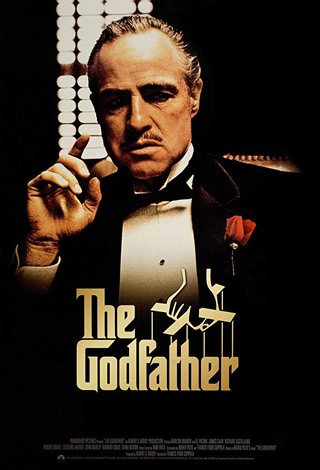
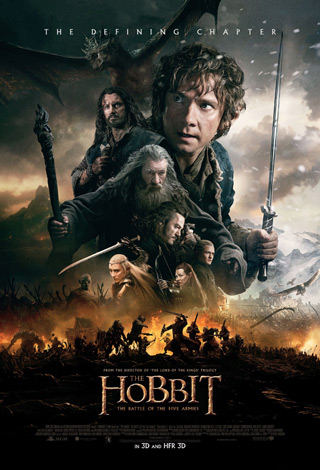
For more on Corky Laing: corkylaingworks.com | Facebook
Purchase Toledo Sessions:
[amazon_link asins=’B07XRX7CBM’ template=’ProductCarousel’ store=’crypticrock-20′ marketplace=’US’ link_id=’8b1b72d8-cf1c-49d7-91bc-12cfab987be3′]
Purchase Letters to Sarah:
[amazon_link asins=’9529415303′ template=’ProductCarousel’ store=’crypticrock-20′ marketplace=’US’ link_id=’96a7a9fb-2f53-4344-bedd-0087c1004f14′]
Feature photo credit: Diana Ioana Bobes

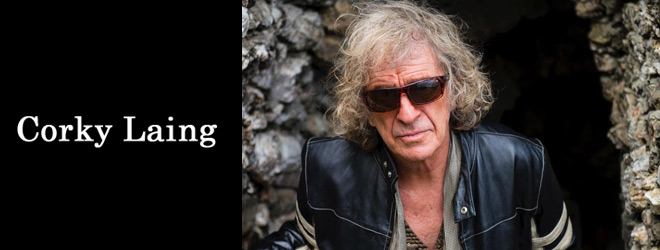
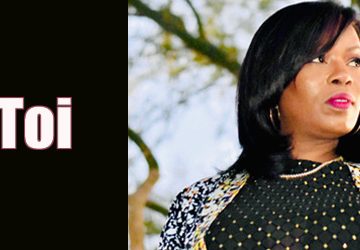
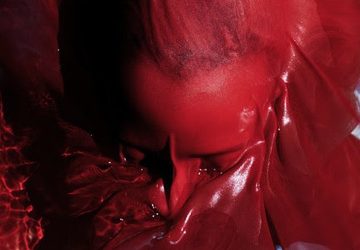


No comment